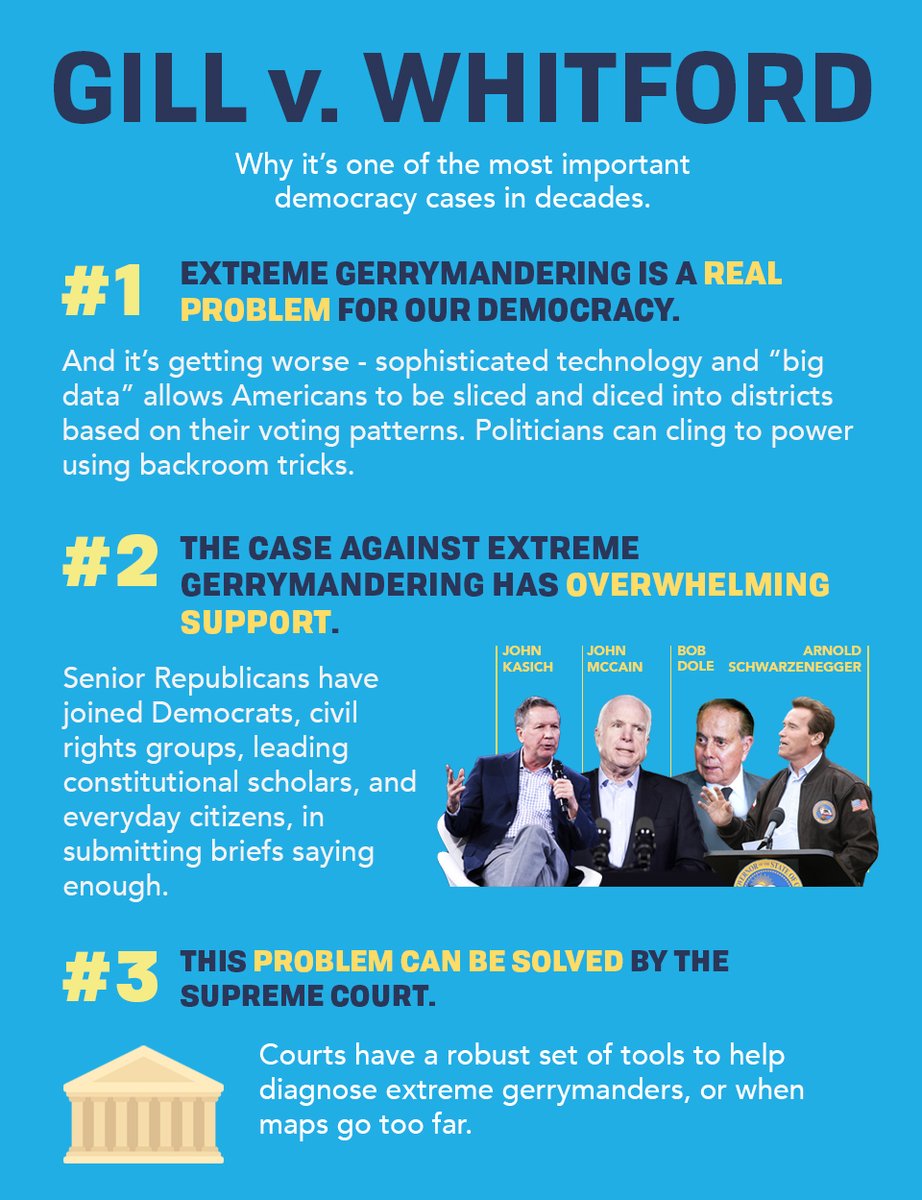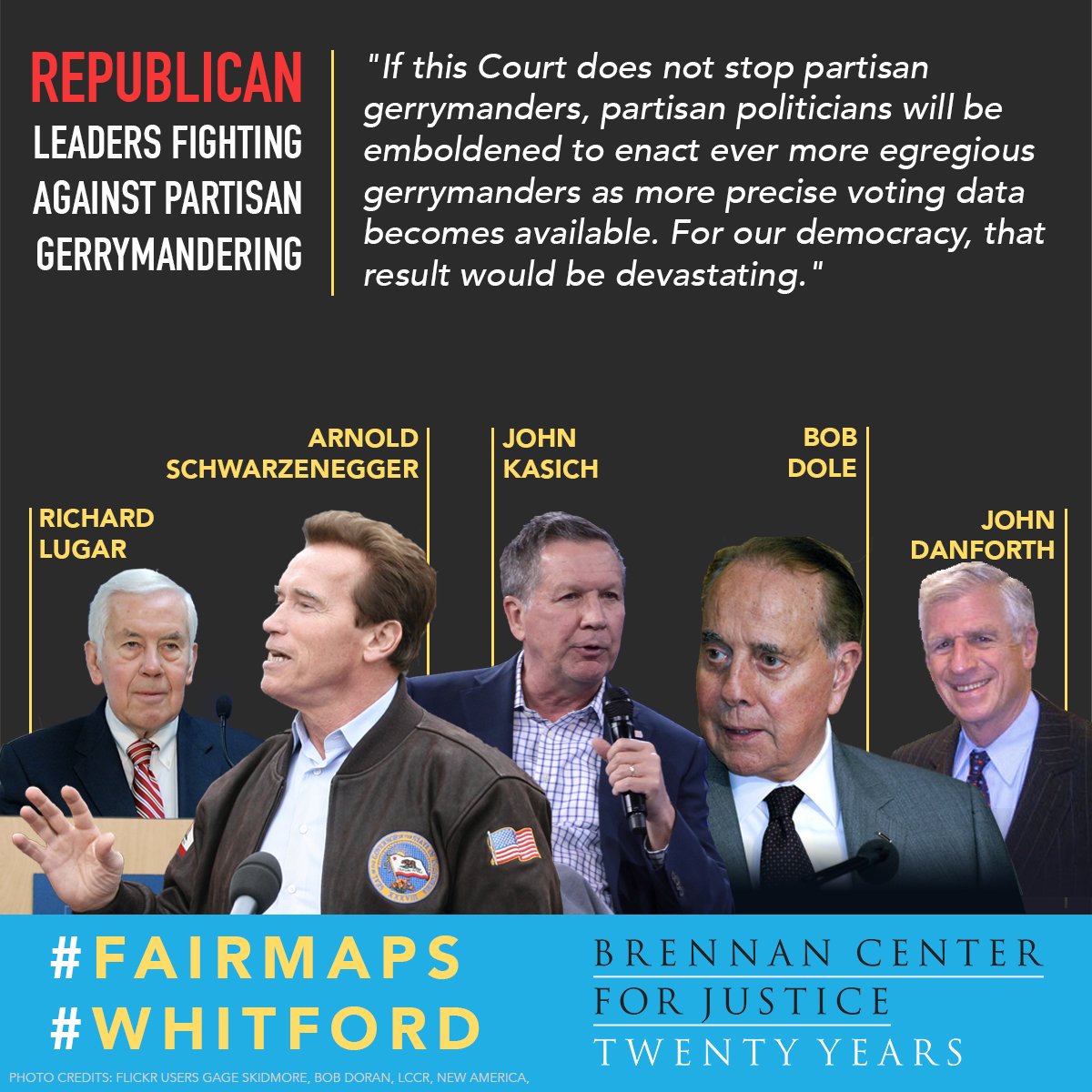On October 3rd the United States Supreme Court will hear oral arguments in landmark redistricting reform case Gill v. Whitford. The Court's decision in this case has the potential to decide, whether the Constitution imposes a limit on state legislators’ ability to engage in objectively measured, hyper-partisan gerrymandering. This case will also allow the Court to say that the most extreme instances of partisan gerrymandering, those that solely prioritize crippling another political party’s power at the expense of all other traditional districting criteria, are not constitutional.
Because the gerrymander being challenged in the Gill v. Whitford took place in Wisconsin, a state with a Republican majority, it was important to build a coalition of courageous Republican leaders willing to call for reform measures that have the potential to decrease Wisconsin's Republican legislative majority and which could also impact other electoral contests across the country. Governor Schwarzenegger, a long standing supporter of electoral reform efforts that increase competition amongst politicians and empower voters regardless of party, worked hard to recruit likeminded Republicans who prioritize what is best for people over partisan politics to support the plaintiffs' case in Gill v. Whitford just has he has worked to support redistricting reform in states like California and Maryland where Democrats hold advantages.
Earlier this week Governor Schwarzenegger and a number of prominent Republicans, including Senator John McCain, Governor John Kasich, Representative Mark Meadows and former Senator Bob Dole, filed amicus briefs that explained to the Court, based on their firsthand experiences, why they support common-sense redistricting reform.
The brief Governor Schwarzenegger filed outlined the problems that gerrymandering causes governors in their home states and the benefits they derive when governing after campaigning for every vote across the political spectrum. The amicus brief highlighted the fact that governors across the country are more interested in achieving results than engaging in political gamesmanship. The governors who joined Schwarzenegger in signing the brief made it clear that they believe eliminating the most extreme partisan gerrymanders will help decrease polarization in state legislatures, and thereby strengthen governors’ ability to achieve legislative priorities and effectively govern their respective states.
Speaking to the press shortly after filing the brief Governor Schwarzenegger explained why he he is so opposed to partisan gerrymandering and why he chose to support the plaintiffs in the Gill v. Whitford.
"I am honored to stand together to fight for a sane system that puts the power where it belongs: not with politicians, with the voters," said former Governor Arnold Schwarzenegger. "When the average congressional margin of victory is 37%, we know something is off. Democracy requires competition to create performance. I want to thank all of the leaders who stood up to sign amicus briefs to tell the Supreme Court we will not stand for a fixed system. It's time to end the incumbent protection racket of gerrymandering and let our politicians know that they must earn our vote. This isn't a Republican or Democratic issue. It's a people issue. No matter our party, we deserve leaders that represent us, the voters."
Brian Fitzpatrick, Republican Congressman from Pennsylvania, outlined his reasons for joining the amicus brief filed by current and former house members. “You have 435 districts in the nation, and there’s probably only 20 or so that are legitimate swing districts. For the 415 safe seats, their main election is in the primary, not the general. When the main election is in the primary, you legislate accordingly.”
The President of Common Cause, Karen Holbert Flynn, praised Governor Schwarzenegger and Representative Flynn for their courage in supporting the plaintiffs in the case. She added that the brief that Common Cause filed highlights that redistricting reform is a non-partisan issue and that her organization prides itself on working with members of both parties committed to prioritizing voters interests over the interests of politicians. Flynn pointed out that Common Cause is currently working with Republicans and Democrats on redistricting reform efforts in nine states (Florida, Georgia, Indiana, Maryland, Michigan, Nebraska, North Carolina, Ohio and Pennsylvania). Flynn also warned that technology is accelerating the proliferation of gerrymandering and in order to check extreme polarization citizens need the tools and precedent that the Gill v. Whitford case would provide.
The USC Schwarzenegger Institute long considered redistricting reform a top-priority and has commissioned a number of research papers examining the effects of gerrymandering on legislative behavior and polarization. According to the work of Schwarzenegger Institute Faculty Fellow Christian Grose following the political reforms passed in 2008 and 2010 the California State Legislature became more moderate and more interested in appealing to voters across party lines. Grose's research shows a significant reduction in legislator ideological extremity, with a 34 percent reduction in the Assembly, and a 31 percent reduction in the Senate. Additionally recent polling shows that voters have a considerably higher opinion their Sacramento legislators than they do of their Washington congressmen.


